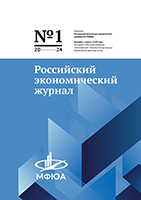Архив
Российский экономический журнал 5 / 2015
К характеристике современных форм преференциального сотрудничества государств
В. Ремчукова
Автор
Ремчукова В.К., аспирант кафедры международных экономических отношений и внешне-экономических связей Университета МИД России (МГИМО)
Аннотация
Рассматривается такая значимая черта современных международных экономических отношений, как заключение и реализация большого числа преференциальных межгосударственных (не многосторонних) торговых соглашений (ПТС). Автором статьи: а) приводятся эмпирические данные о распространении ПТС; б) по критерию наиболее часто фигурирующих в этих соглашений мер осуществляется классификация (группировка) ПТС; в) характеризуется их содержательная проблематика с акцентом на инвестиции, права интеллектуальной собственности и движение рабочей силы.
Ключевые слова:
«международные экономические отношения», «преференциальные торговые соглашения», «ВТО», «инвестиции», «интеллектуальная собственность», «рабочая сила».
Список литературы
1. B a l d w i n R. Multilateralising 21st Century Regionalism. — OECD, 2014.
2. B e r g e r A. China and the Global Governance of Foreign Direct Investment. — The Emerging Liberal Bilateral Investment Treaty Approach // DIE Briefing Paper (German Development Institute). — 2008. — Vol. 10.
3. Eastern European Borders Annual Risk Analysis 2015. — European Agency for the Management of Operational Cooperationat the External Borders of the Member States of the European Union (FRONTEX), 18 May 2015.
4. C l a r k s o n S. Does North America Exist? Governing the Continent After NAFTA and 9/11. — Toronto: University of Toronto Press Incorporated, 2008.
5. C a r p e n t e r T., L e n d l e A. How Preferential is World Trade? — Geneva: Graduate Institute Geneva Center for Trade and Economic Integration, 2010.
6. Global Economic Prospects 2006. Economic Implications of Remittances and Migration. — Washington, DC: World Bank, 2006.
7. M i r o u d o t S. «Investment» in Preferential Trade Agreement: policies for development. — Washington, D.C.: The World Bank, 2011.
8. S t e p h e n s o n Sh., H u f b a u e r G. Labour Mobility / Preferential Trade Agreement Policies for Development: a Handbook by Jean-Pierer Chauffour and Jean-Christophe Maur. — Washington D.C.: World Bank, 2011.
9. WIPO Report «The Economics of Intellectual Property in South Africa». — Geneva: World Intellectual Property Organization, June 2009.
10. World Trade Report 2011. — Geneva: WTO Secretariat, 2011.
11. World Trade Report 2014. — Geneva: WTO Secretariat, 2014.
12. World Investment Report. 2014. — New York, Geneva: United Nations, 2014.
13. U.S. Citizenship and Immigration Services. — http://www.uscis.gov/working-united-states/temporary-workers/tn-nafta-professionals.
14. U.S. Citizenship and Immigration Services. — http://www.uscis.gov/working-united-states/temporary-workers/temporary-nonimmigrant-workers.
15. U.S.—Australia Free Trade Agreement — Questions and Answers About Pharmaceuticals. — URL:https://ustr.gov/about-us/policy-offices/press-office/fact-sheets/archives/2004/july/us-australia-free-trade-agreement-questions-and.
16. U.S. Congress Act «Trade Act of 2002». — URL:http://www.gpo.gov/fdsys/pkg/BILLS-107hr3009enr/pdf/BILLS-107hr3009enr.pdf.
17. URL:http://www.undp.org/content/dam/undp/library/hivaids/English/TRIPS-UNDP-Russian.pdf.
18. URL: https://www.wto.org/english/tratop_e/region_e/region_e.htm.

